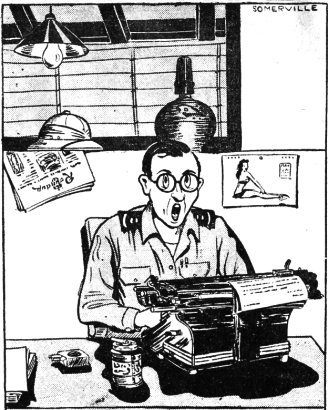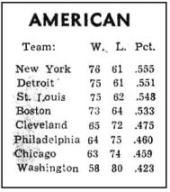

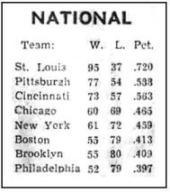
VOL. II NO. 38 REG NO. L5015 DELHI, THURSDAY JUNE 1, 1944
MYITKYINA - Seventeen days after Chinese-American forces swept into adjacent Pamati Airfield, stubborn Jap resistance continued today from within the ruins of Myitkyina. It is obvious that the garrison's defenders are trapped and doomed; but it is clearly evident that, despite tightening Allied pressure from three sides of the town,
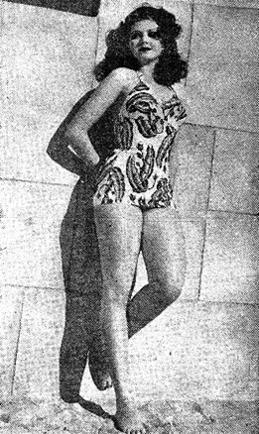 For some strange reason we can't explain, the manpower shortage hasn't seemed to affect Ann Miller. Our observers
tell us that men in Hollywood region are not only willing but anxious to date the curvaceous actress.
For some strange reason we can't explain, the manpower shortage hasn't seemed to affect Ann Miller. Our observers
tell us that men in Hollywood region are not only willing but anxious to date the curvaceous actress.
|
One ray of sunshine pierced the deep clouds of gloom at Lt. Gen. Reyna Mutaguchi's Jap headquarters. That was the breaking of the principal Chindit road block south this week in Northern Burma, the Japanese certainly had no cause for celebration. Lt. Gen. Joseph W. Stilwell's all-Chinese forces, sweeping southward toward Kamaing in the Mogaung Valley, clamped on a road block between Kamaing and Mogaung and liquidated enemy pockets at Sharaw and Warong.
ABANDON ROAD BLOCK
The Chindits abandoned their road block following a bitter four-day engagement against a numerically-superior Jap force advancing from the south in an effort to relieve their Northern Burma forces. However, the reopening of enemy communications is only theoretical, for Maj. Gen. Joe Lentaigne's penetration units are still operating deep in Jap territory, destroying rail lines, blowing up bridges and harassing enemy troops.
A British officer with the Chindits described the clash as the Japs "epic battle of the entire campaign." The enemy first seized the airfield which supplied Lentaigne's forces, then launched a fierce assault upon the Britishers' defense perimeter. They even brought up anti-aircraft guns in an effort to prevent transports from dropping supplies and ammunition. After a systematic artillery pounding they then launched several infantry attacks in which they suffered heavy casualties. The Chindits were forced to withdraw when their ammunition was exhausted.
STRIKE UNEXPECTEDLY
Striking swiftly and unexpectedly, Stilwell's Chinese virtually isolated the Mikado's long-suffering Kamaing garrison by establishing their road block six miles south of Kamaing and 19 miles above Mogaung in this section, they also captured six warehouses of supplies and ammunition representing considerable booty, three 75mm guns and a 150mm gun and 100 horses. They also ambushed a convoy of 25 trucks, killing the drivers and destroying the vehicles.
Full details of this operation are not yet available, except that the Chinese hacked their own trails, plodding along through mud and rain to their objective.
Kamaing's fate now appears sealed. In four columns, the Chinese are converging upon the town. One of these is west of the main road bypassing Malakawng, which is surrounded. On the east flank, the capture of Warong released another unit. At Warong, the Japs died to the last man, the coup de grace destroying the remaining 100 members of the garrison. Two other columns are hammering southward from Manpin and Sharaw, the latter falling this week.
While Chinese-American forces driving from north, south and west tightened the Japanese perimeter within Myitkyina, the enemy outside made several vain attempts to help the besieged garrison from the west. One of these was a night attack upon the airfield in which the defenders successfully warded off four assaults. Another was the thrust at the Namkwi Railroad Bridge which was seized last week. In these and other engagements, the enemy suffered severe losses.
Escape to the south was cut off for the enemy when Stilwell's forces at Zigyun pushed to the outskirts of Myitkyina in a northward drive that covered a mile and a half in one push through heavy mortar and automatic fire.
Meanwhile, the disputed railroad station in the town was retaken by the Chinese which means that the Allies now hold half the town.
Sunday, Jap vehicles were successfully shelled in the east section of the town fronting the horseshoe curve of the Irrawaddy River.
After days of steady, driving ran, the weather suddenly cleared Sunday. This was the signal for Brig. Gen. John Eagan's planes to appear from the west to lend close air support. Mitchells, Mustangs and Warhawks tore at the Japs digging themselves into Myitkyina's bazaar area. The aircraft dove in from all angles, first unloading 500-pound bombs and then strafing the vitals of enemy resistance after their explosive eggs had been released. They continued to fly "round-the-clock" as long as the weather would allow.
Stilwell returned to the battle area again this week for several days, and while there, announced that the Japanese death toll in Northern Burma since November has been 12,000, 3,000 of which are claimed by the Chindits. Ten thousand of these who paid the supreme sacrifice for the Son of Heaven's ambitions have been counted within the past 10 weeks.
Fighting bitterly in sleet and ice, Chinese forces pushed rapidly forward on the west bank of the Salween River this week despite frequent Jap counter-attacks and, at week's end, forward units were within 25 miles of the Burma Road.
The Japs have rushed in large numbers of reinforcements but have failed to stem the violent onslaught of the Chinese troops, who are attempting to link up with Stilwell's forces in Northern Burma.
Most important victory of the week for the Chinese was the capture of Tantangtzu, where a surrounded Jap garrison was starved out and is now being pursued westward. Tantangtzu is 29 miles northeast of Tengchung, vital enemy communications center.
A number of towns and villages were captured by the Chinese, only to be retaken by counter-attacking Japs. Besides Tantangtzu, the advancing Chinese forces have cleared the enemy from Chiaotou, Pingka, Hapong, in the Kuniong area and Hpimaw Pass.
In the Mamein Pass area surrounded enemy forces launched several unsuccessful counter-attacks at Chaikungtang and Lengshukou, which were halted by Chinese artillery. Jap casualties were high in these negagements and also at Hungmoshu, where bitter fighting is taking place.
ON THE SALWEEN FRONT WITH ATTACKING CHINESE
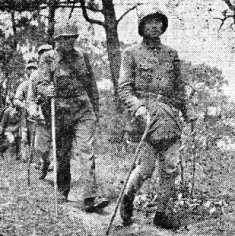 Maj. Gen. Hong Sing of the Chinese forces which recently crossed the Salween, advances toward the front with
Maj. Laurence W. Beilenson, former attorney of the Screen Actors Guild in Los Angeles, California.
Maj. Gen. Hong Sing of the Chinese forces which recently crossed the Salween, advances toward the front with
Maj. Laurence W. Beilenson, former attorney of the Screen Actors Guild in Los Angeles, California.
|
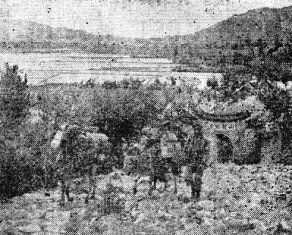 Pvt. Raymond L. Lawless, of New York City, U.S. Army Signal Corps photographer, employs cow-pack to carry his
cumbersome equipment up a mountain trail to the heights overlooking the Salween. The drive coincided with the
Chinese-American push upon Myitkyina, Northern Burma citadel now under siege.
Pvt. Raymond L. Lawless, of New York City, U.S. Army Signal Corps photographer, employs cow-pack to carry his
cumbersome equipment up a mountain trail to the heights overlooking the Salween. The drive coincided with the
Chinese-American push upon Myitkyina, Northern Burma citadel now under siege.
|
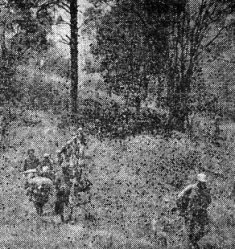 A Chinese reconnaissance party, headed by Maj. Gen. Hong and Maj. Beilenson, leave forward headquarters to establish
new headquarters in advance of the Chinese troops pushing across the Salween into Burma.
A Chinese reconnaissance party, headed by Maj. Gen. Hong and Maj. Beilenson, leave forward headquarters to establish
new headquarters in advance of the Chinese troops pushing across the Salween into Burma.
|
STILWELL RECOMMENDATION APPROVED
BUT COMMITTEE STILL HOLDING UP DECISION UPON PATTON
WASHINGTON - The Senate Military Affairs Committee this week granted long-delayed approval of permanent promotions for 13 generals, including Joseph W. Stilwell from brigadier to major general, but again declined to recommend an advance for Lt. Gen. George S. Patton.
Official reason for withholding Patton's promotion was, "Committee members are not fully satisfied to raise his rank at this time," but members said their decision was based on the face slapping incident and Patton's speech in which he foresaw the U.S. and Britain ruling the post-war world. The proposal may be acted upon later, however, or it may die with the expiration of the present session of Congress.
Other promotions approved by the Committee, subject to early Senate confirmation included: Brehon Somervell, from Engineer Corps colonel to major general; Jonathan M. Wainwright, from brigadier to major general; Joseph McNarney, from Air Corps colonel to major general; George Kenney, from lieutenant colonel to brigadier general; mark Clark, from Infantry lieutenant colonel to brigadier general; Omar Bradley, from Infantry lieutenant colonel to brigadier general; Ira C. Eaker, from lieutenant colonel to brigadier general; Millard Harmon, from colonel to brigadier general; Robert Eichelberger from Infantry colonel to brigadier general; W. B. Smith, Allied Chief of Staff in the European Theater, from lieutenant colonel to brigadier general; and Thomas Handy, from Infantry lieutenant colonel to brigadier general.
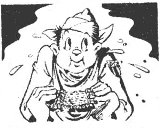
|
Corn
HEAVENLY DISH FOR AIRMEN
ASSAM - American corn on the cob, an item generally seen only in the wildest of CBI dreams, is now almost a reality for a USAAF fighter group of Brig. Gen. John F. Egan's Northern Air Sector Force.
Capt. John L. Clark, of Greenwich, Conn., is the Yankee "farmer" who is nursing the unique Victory Garden, on a plot of ground about 50 feet square midst Assam's tea plantations and rice paddies.
The corn is now 10 feet high and airmen are positively drooling over the happy prospect of sinking their fangs into an ear, for some the first time in two years.
BIG SURPRISE GIVEN G.I. BY AIR 'DETOUR'
NORTHERN BURMA - He was in the Hukawng hamlet on business. Trucking on down the Ledo Road was a long way home, so he dropped in at the airport, cased the joint. Fifteen minutes later, he found what he wanted - a kind-hearted pilot.
"Going to Ledo?" he asked hopefully.
"Sure, Hop in."
He did, feeling mighty smug over his ability to read human nature. Why, he'd be back in civilization in no time.
The plane soared away. He settled down comfortably, allowing himself the luxury of a brief doze.
Presently he became aware that they were circling for a landing. Golly, this sure beat riding the road in a convoy. He looked out. Yup, there was a field below. Suddenly his eyes bulged. Bomb craters yawned up at him. Medica trotted toward a tent with stretcher patients. Everywhere there was confusion and activity.
"Hey, this isn't Ledo!" he managed to stammer.
The pilot grinned cheerfully. "Nope. Had to drop some stuff off here. But sit tight. We hit Ledo next."
He gulped. "W-Where are we?"
"Myitkyina," answered the pilot. "We just took over here yesterday."
LEDO ROAD USED AS LANDING FIELD
Seriously-Injured Soldier Evacuated By Air
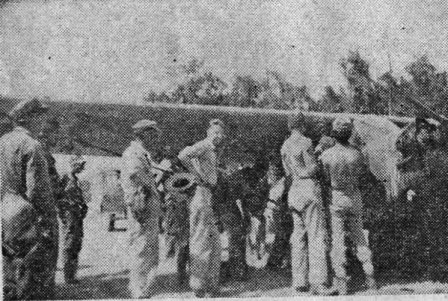
On Ledo Road Landing Strip |
Medico capts. Trotter and Harris performed expert first aid at their small station, only a short distance from the scene of the accident. But both the nearest hospital and landing strip were many miles away, and it was obvious that the patient, suffering badly from shock, could be moved only a few hundred yards by ambulance.
However, just 200 yards away stretched a wide, straight section of the Ledo Road, and the Engineers of the first outfit to start its construction stoutly promised that this strip would provide landing accomodation for a litter-bearing reconnaissance plane.
Trotter agreed and arranged for the aircraft.
The Engineers laid out large arrows at each end of the "field" with white sheets. When the plane dipped over the road, the anxious group on the ground hopefully waived it to a landing. One hasty glance and the pilot brought his ship to earth, hopped out and grinned: "You've really got a strip here."
Blood plasma was administered to the patient. He was carried to the plane on a hospital ship stretcher and securely fastened in. The tiny mercy craft swung lazily into the breeze and seconds later, was a tiny dot, growing smaller, hospital bound.
Lend-Lease Aid To Be Boosted For Chinese
WASHINGTON - President Roosevelt's 15th Lend-Lease report to Congress revealed that the program reached the record-breaking total of $4,239,000,000 in supplies and services delivered to the Allies in the first quarter of 1944, with the bulk going to the European Theater to support a three-way smash at Hitler's Fortress Europa.
But the President promised that eventually Lend-Lease goods would be poured into China for an all-out drive against Japan. He declared, "Our offensives in New Guinea and Burma against the Japanese fortress and islands of the Central Pacific is proof that the battle for Japan is not waiting upon the successful conclusion of the battle against Germany."
HELPED TO UTMOST
FDR said that China is being helped to the utmost of the United States' ability and that the vast majority of Lend-Lease shipments to the CBI Theater have so far, of necessity, gone only as far as India and Burma.
Roosevelt promised that eventually direct communications with China will be established not only on land but by sea as well. When that time comes, he promised, Lend-Lease materials will be poured into China in a volume needed to enable Chinese forces, combined with other Allied forces, to achieve final, complete defeat of Japan.
MOSTLY TO EUROPE
The report showed that $24,225,000,000 worth of supplies and services have now gone from the U.S. Lend-Lease arsenal, nearly three-fourths of it to Britain and Russia, much of this during recent months.
The President said: "The United Nations are now about to strike new and mightier blows at Nazi-occupied Europe from offensive bases in the west, south and east. Through Lend-Lease, we have made certain that every man in the forces of the other United Nations who goes to battle beside an American fighting man has what he needs to hit the common enemy as hard as possible."
The report showed the monthly tonnage of supplies reaching China over The Hump is now 15 times what it was a year ago.
Appreciation Shown By Wounded Chinese
CHINA - To show their appreciation for the recent activity of American and Chinese airmen of the 14th U.S. Air Force, 1,800 wounded or disabled Chinese of a Soldiers of Honor Home near an American air base fasted for three days in order to use the accrued ration money to buy gifts for the fliers.
Representatives of the grateful veterans brought the gifts from the Home to a town in China, where they were met by a delegation of American and Chinese aviators.
In his acceptance speech on behalf of the Americans, the Yank commander said: "The only way in which we can repay such zealous affection is to strike harder blows at the enemy until we have destroyed him."
'May-Lay-Ria'
IMPORTANT AIR-GROUND LIAISON
That was the unique message Capt. Roland J. Migues of Kinder, la., drawled into the radio transmitter of his A-36, high over the Mogaung Valley.
Down below, in the rugged jungle country, Lt. "Blue Barracks Bag" William L. Fleming, of Richmond Hill, N.Y., smiled as he received the message. His unit, part of Brig. Gen. Frank Merrill's Marauders, was surrounded by Japs and was being shelled heavily.
There was good reason for his smile. The word "May-lay-ria" represented air support - the best solution to the Marauders' predicament; Migues and his squadron of Eastern Air Command fighter-bombers had arrived and were asking for bombing instructions from Fleming, Liaison Officer.
COORDINATED WORK
The coordinated work of Migues and Fleming was one of the reasons the Marauders' advance on Myitkyina was a success.
The march through the North Burma jungles was a gamble, and some of the units were certain to be cut off from the rest. When that happened, Eastern Air Command support was the answer to relieve the pressure. It was the duty of the Air Liaison Officers to direct the bombing of enemy positions, clearing the way for the Marauders' rapid push.
NO EASY JOB
Directing the bombing was no easy job. In Fleming's case, some of the Jap targets were within 200 yards of the Americans, which called for precision bombing of a high order.
When Fleming's unit was cornered by the Japs, Migues' squadron was assigned the air support detail. For 26 days, EAC fighter-bombers swept over Jap positions hourly, strafing and bombing with great accuracy. When this failed to dislodge the enemy, the pilots doubled their missions and attacked every 30 minutes.
After a week of this hammering, the Jap guns were silinced, and "Blue Barracks Bag" Fleming notified "May-lay-ria" Migues, "We're o.k. now - thanks to your air support."
The Marauders then continued their advance, which culminated in the historic capture of Myitkyina airfield.
Mrs. Doolittle Kept Secret
WASHINGTON - Mrs. Jimmy Doolittle knew for a whole year that the aircraft carrier Hornet was the "Shangri La" from which Tokyo Raiders under her husband, Lt. Gen. James H. Doolittle, operated.
"I want to tell you," she told a Women's Club luncheon, "it was the most miserable year I ever spent in my life. I was so afraid I might give it away."
She said that no wife or sister should know secret information about their relatives' military affairs, because she might accidentally let it slip out.
Mess Sergeant
SEED HIS DOOTY AND DOOD IT
APO 689 - It has been said repeatedly that an army travels on its stomach, but you can't sell that idea to S/Sgt. Fred W. (Mess Sergeant) Bean any more. He knows what hurts after a recent India experience, and it ain't his tummy, chum.
Bean, a veteran of CBI-land, recently left his happy home here to step over to the nearest Indian village (158 miles distant) to but a few extras for the unit's mess. After acquiring 50 pounds of menu-brighteners, however, he had the misfortune to discover that he had slightly misplaced his transportation.
Considerable thought produced no better solution to the problem than to hoist the heavy bundle on his shoulders and start the long way back. The first 100 miles may have been the hardest, but the next 58 miles were no snap, either, with the food parcel getting heavier with every step. The sole of one of Bean's shoes did its duty like a soldier, but that of the other brogan vanished like the Italian Army.
In spite of it all, a weary, muddy but triumphant Bean staggered into the base only three days later, still clutching his precious bundle of delicacies. The appreciation of his buddies, who claim this is the most outstanding act of big-heartedness ever performed by an Army mess sergeant, cheered the weary traveller somewhat, but failed to take the ache out of his battered tootsies.
FORMER ROUNDUP BOSS SWEATS OUT ATTACK
MYTIKYINA - Wahoo, Nebraska's gift to journalism, Lt. Clancy Topp, former editor of the Roundup (Spring, 1943), reflected philosophically today that Public Relationing, Army style, isn't the soft touch people so casually imagine.
Topp, conducting Life photographer Bernie Hoffman, on a tour of the Myitkyina battle area, was one of those on the airstrip when the Japs staged a vicious, though unsuccessful counter-attack last week in which they made four separate charges.
When the fighting started, a Jap bullet sliced through Hoffman's raincoat and clothing and rattled off his ribs. He and Topp promptly and wisely chose the comforts of a long night in foxholes with water up to their shoulders.
Related Topp: "The Japs opened up after 9 o'clock with machine guns, rifles and mortars. Tracers and mortatr explosions resembled a Fourth of July celebration, but a damned sight more dangerous. The Japs never got onto the field but they were all around the north end. The battle did not end until 5 a.m.
It's a grim war for the journalistic profession, too. (For more about this story see Under Siege at Myitkyina)
ATC BASERS POOL PX SUPPLIES FOR BURMA RAIDERS
Even Topkick Contributes Precious Beer
APO 467 - Hearing of the plight of some of our ground forces in Burma who have been chasing the Japs around so fast that their PX supplies haven't caught up to them, G.I.'s at this ATC base decided to pool their resources.
One charitable G.I. started the ball rolling with the announcement that when he made his next trip to the front as a member of a transport crew, he was going to take along his spare cigarettes so he could dish them out to the boys.
Other G.I.'s added to the total, until there were over five large bags of cigarettes, juices and other precious commodities not normally found in the combat area.
The climax came when the first sergeant contributed all the beer he had been hoarding for the next "real hot day."
Plans are now underway to make this SOP. Other outfits that wish to join are promised the co-operation of the air-dropping specialists. It begins to look just "Xmas in June" for some of the Yank Burma force.
HOW WET IS OUR VALLEY
NORTHERN BURMA DRENCHED BY RAINS
STILWELL MAKES SOGGY TOUR
NORTHERN BURMA - If the torrents of water which have fallen into our green valley, beaten on our hammocks, and saturated our possessions during the past few days are not the beginning of the long-awaited monsoon, then we shudder to contemplate the real thing. Every time it rains heavily - which is quite often these days - you hear comments around camp that "this is it." But experts shake their heads and assure you that when the real thing breaks it will come on the wings of the southwest wind and that it will rain unceasingly for three days straight.
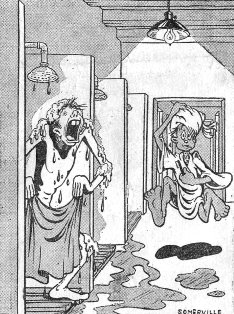
- WATER SHUT OFF AGAIN?" |
This drenching curtain raiser however, has shown us what heavy rains do to roads, to trails, to battlefields, to air operations and to the spirits of the men. Already the intermittent downpour has slowed the pace of our North Burma offensive.
FOLLOWED STILWELL
We went forward yesterday in the wake of our salty general, Joseph W. Stilwell, who won't be deterred by muck or high water from periodic visits to his troops.
There was a bridge out but that didn't bother the Old Man. He slid down one pile and across a plank to the opposite shore, more like a juvenile than a three-star, 61-year-old general. Then in our jeeps we rocked, bounced and splashed over some of the worst roads I have seen anywhere. From this ordeal, Uncle Joe came up mudflecked but cheerful.
We arrived at the camp of a Chinese division commander, Maj. Gen. Liao Yao-hsiang, by a swollen stream deep in the jungle. Stilwell, who despite his gruffness, is a shrewd diplomat, first presented Gen. Liao with a couple of congratulatory banners in the best Chinese tradition to commemorate two of his recent victories, then went into a conference on battle plans. It was an amusing interlude when Stilwell called to one of his aides, "How's our stock of cigarette lighters?"
LIGHTER FOR GENERAL
"We have some, sir," said the aide.
"Well Gen. Liao says it's too wet for matches. See that he gets 15 lighters right away."
"Yes sir," replied the aide, producing a lighter from his pocket, "the general can have mine for himself."
"That's one," said thrifty Stilwell. "We owe you 14 more."
When Stilwell had gone, Liao told us of his problems. His 22nd Division, which has been fighting long and hard through the Hukawng and Mogaung valleys, is showing the effects of the tiring, though successful campaign. The general told how his troops are fighting and living in foxholes deep with mud and water. Roads and trails are in sloppy shape and supplies to forward areas must be transported by coolie. he reckoned that in another two weeks these conditions would be at their worst. It is a comfort that the Japs are probably suffering even worse from the muck and rain.
Seeing these conditions, our respect for the coming monsoon grows. Keeping roads and bridges in repair, keeping airfields open and maintaining offensive operations during the coming months is going to be an extraordinarily difficult problem.
Bum To Hero: In A Matter Of Minutes
ALONG THE LEDO ROAD - The Burma monsoon was gaining in intensity as the Engineer audience gathered for its semi-weekly movie in the open-air jungle arena. They came with rain coats and shelter halves draped over them.
The drizzle turned into a steady downpour as the brave G.I.'s stood up for their first-reel stretch. Soon the wind gained momentum, brought leaves, twigs and dead vines down on their heads.
Pvt. Irwin Wyman, the movie operator, held a barometric finger in the air and ducked back into the soap box projection booth.
The tempo of the wind mounted, more rain and branches fell, but the crowd stayed put. Finally, Wyman clicked off his projector, shouted above the din. "That's all fellows, the weather's too tough."
Grousing at the operator, the dripping G.I.'s left the hillside. Just as the last few were clear of the area, a cracking noise rang out. A 30-foot-long, soggy limb, with gangling branches, came thundering down, smashing make-shift seats and covering the place with litter. Now, Wyman's a hero!
Jap Bid Beaten Back At Imphal, Losses Heavy
KANDY - The Japanese this week made a last determined attempt to capture Imphal before the monsoon breaks in earnest, but were thrown back with heavy losses, according to SEAC HQ. The attack was the strongest the Japs have yet made on the important British supply base since the campaign began on the central Indo-Burma front.
Although so-called experts say the monsoon has net yet arrived, fighting in the Imphal-Kohima area during the past week has been handicapped by heavy rains. The downpour, plus British road blocks and patrols, have made the supply position of the Japanese in the area precarious.
SUPPLY DIFFICULTIES
The capture of Imphal would give the Japanese the supplies they need in order to hold their positions during the imminent monsoon. Without it, they will have to rely on water-logged trails and roads for monsoon supplies.
At Kohima, the Japanese attempted to smash through British defenses and recapture the Naga village north of the town, but the defenders stoutly held their positions. The British countered with an attack on the Aradura Spur, south of the village, and after heavy fighting, won the position.
8,500 JAPS KILLED
Abortive Japanese attempts to break the British road block on the Tiddim Road cost the enemy heavily. The Fourth Corps estimates 8,500 Japanese have been killed so far in the present operations on the central front.
At week's end, Allied forces surrounded and eliminated the enemy at several places in the Bishenpur area, captured much booty and inflicted heavy punishment.
USAAF and RAF fighters and fighter-bombers, working in close support of ground troops, continued their attacks on enemy communications, supply dumps and strong points whenever the weather permitted.
China Won't Be Knocked Out Of War
WASHINGTON - Gen. Shan Chen, chief of the new Chinese Military Mission to the United States, declared at a press conference that "it is absolutely impossible for Japan to knock China out of the war."
He appealed for more concerted action now among the Allies in the Far East. China's greatest need, he explained, is aircraft and heavy equipment.
The general estimated that Japan's troops number 2,400,000, with 29 divisions in China, 34 divisions in the Southwest Pacific, 12 divisions in Burma and Thailand, 24 divisions in Manchuria and 11 divisions in Japan proper.
He said that a Japanese prisoner had informed the Chinese that Japan'e airplane production is now about 1,500 planes per month.

If we were to heed the advice so generously contributed by Sir Keith Murdoch's "Burma in Focus" article, published in the May 25 issue of Contact, the course of action for us to follow would be to pack our barracks bags and get the hell out of here. Dogmatically, Sir Keith, who has been Australian Director-General of Information, concluded after a visit to India and the Burma front that what the Men of Stilwell - Chinese and Americans, and now the Chindits - are doing in Northern Burma is effort profligately squandered.
We quote a significant portion of one paragraph: "Whether the American road should have been allowed to govern our strategy here is, to my mind, highly debatable. I do not believe that even those great constructionists, the American Army Engineer Corps., can get it through to China in time to help."
Sir Keith reflects the identical you-really-can't-do-that-old-boy attitude with which some folks hooted Stilwell's declaration that the Jap could be licked in jungle fighting by the Chinese and that the Ledo Road could be pushed through against the discouraging monsoon. There are somewhat more red faces now that the Chinese, with the help of Merrill's Marauders, have broken the back of the vaunted Jap 18th Division and have pushed the battered enemy to within the shadows of Kamaing; that Chinese-American forces are within the vitals of Myitkyina; that, through hell and high water, the Ledo Road has progressed upon the heels of the combat troops.
There is one fact etched so sharply against the backdrop of the controversy that Sir Keith should clearly recognize it. And that is the point that Stilwell's troops are aggressively on the offensive in Northern Burma. They are chewing up a crack Jap division. They are forcing the enemy to defend, rather than presenting him with the golden opportunity to attack when and where he pleases. Nor are the blockaded Chinese uncognizant of the determined struggle to hammer a land route through to them; and, indeed, this endeavor has been an inspirational force in keeping China in the war.
MUST MAKE YOUR OWN BREAKS
You can't sit back on your haunches and wait for the breaks, Sir Keith. In warfare, you have to make your own breaks - by striking aggressively and following through.
When the American, Chinese, British, West African, Scottish and other troops risking life and limb in the Northern Burma venture learned from no less an authority than Sir Keith how valueless is their campaign, their morale undoubtedly spurted upward. More well-timed articles of this nature are exactly what the doctor ordered - for the Japs. Fortunately, the military leaders concerned (Stilwell, Mountbatten, Lentaigne) don't hold the same view as Sir Keith.
It is wonderful, indeed, how a person so newly arrived as Sir Keith reached a decision in such rapid order. A few conversations, a few hurried trips . . . and he has so much knowledge on his fingertips that he can advise Stilwell, Mountbatten and Lentaigne, who may hardly be described as Boy Scouts.
Lentaigne, Chindit Leader, Supports Strategy Advocated By Stilwell In Burma
NORTHERN BURMA - Recently, I had a long interview during an air-raid alert with British Maj. Gen. Walter (Joe) Lentaigne, who now commands the Chindits as the successor to the late Maj. Gen. Orde Charles Wingate.
He outlined the work his men have been doing south of Mogaung for two and a half months of drufgery it took to block any reinforcements for the enemy troops blocking Stilwell's advance southward.
He said: "In my opinion this North Burma campaign is very definitely the clue to the final reconquest of Burma. In this way, all of Burma is opened up before you. Before I came up here, I was skeptical of the value of the Ledo Road as a monsoon supply line, but now I've seen the incredible work of the U.S. Engineers.
"I'm sure it will stand up to the rains and enable us to carry on the fight."
Concerning the Jap as a fighting man, Lentaigne said: "We've proved that in the jungle we can always beat him when we fight him. His fatalism is to be admired from the military point of view and his endurance is marvelous.
"But he's not a good planner. Give him 10 years to produce a plan and he produces a wonderful plan. But throw a spanner into his work and it takes another 10 years to work out a new plan. Keep jolting him until he reels, and then there is nothing for him to do except sit down in a foxhole.
"Admittedly, that makes for tough fighting, but it's not the mentality that wins victories. However, he works with feverish activity and has the mentality of the ant and he's a pretty tough fellow to shift from his purpose."
lentaigne, for no apparent reason, has the nickname "Joe" which also is Stilwell's name and there's a remakable similarity in the manner of outlook of the two men, neither of whom has a lethargic, negative attitude.
When asked whether it was good policy to get behind the Jap and starve him out, Lentaigne said crisply, "Get behind him, yes. But don't just sit there waiting for him, Force him to come out and fight. We won't reconquer Burma by sitting and waiting."
When we asked whether Burma could be by-passed and operations in the jungles made unnecessary by amphibious attacks on Malaya, Lentaigne said: "The Jap will stay in Burma until you root him out of the place. No matter what happens elsewhere, we must fight this campaign to a finish and clean him out of Burma."
Lentaigne was born in Rangoon 44 years ago. He is the son of a judge on the High Burma Court. Throughout his military career, he has always commanded Gurkha troops. He led his Gurkha battalion out of Burma after the first disastrous Burma campaign.
LABOR QUESTION ARISES
As Roundup 'Hires' Scribes
A perplexing question in labor relations reared its ugly head this week when, at the outlay of three annas per diem, the Roundup "hired" two new staff members.
One new staffer is resilient, bouncing Daniel Berrigan. The adjectives we plagerize. They were first used by Rep. Clare Booth Luce (R-Conn.) to describe Berrigan when that glamorous, talented lady busied herself with reporting the ill-fated 1942 Burma campaign for LIFE Magazine. Berrigan was the United Press representative with Lt. Gen. Joseph W. Stilwell's doughty little band of correspondents. he is now acting chief of the UP in the CBI Theater.
The other recruit is Relman Morin, erudite, globe-trotting chief of Associated Press in this neck of the world.
The problem which vexes Ye Ed is whether to treat Berrigan with the respect due a captain or the lesser deference accorded a corporal. During the Burma campaign, Maj. Fred Eldridge, proud father of the Roundup (Winter, 1942), appointed the Fourth Estater as a two-striper, ex-officio, and to the best of our knowledge has never promoted him. However, the War Department has ruled that war correspondents are to receive the amenities of captains in the U.S. Army, if captured, and Berrigan stoutly maintains that being shackled to a Roundup typewriter makes him captive enough.
|
Avengers for the Red, White and Blue We went to hit the rats of Hirohito The criminals, the murderers, and Snafus. C - stands for China B - stands for Burma I - stands for India. He sent us there, our Uncle Sam; Our mission was to fight Japan We're the CBI Guerillas of America They yelled when they charged Then they fell when barraged "Oh, what hit us? They must be Americans" "That's right," we said, "That's why we're here You yellow bastards - we don't fear We're the CBI Guerillas of America For days and for weeks, and for months and for years They will remember us all forever We made them take it on the lam And made them holler "Uncle Sam" We're the CBI Guerillas of America We all remember one day in December We'll fight back hard, till they surrender Our boys that day fought back hard We will finish now in their backyard We're the CBI Guerillas of America Let's all together, write home a letter To keep the home fires burning We're coming back - the day is near - We miss our whiskey and our beer We're the CBI Guerillas of America (Author Unknown) |
The matter has been referred to the War Labor Board.
Berrigan's addition to the staff was born of sheer necessity. Ye Ed counted noses in the office this week and only three peopled answered "Here": T/3 William (Red) Barnum, conductor of the Broadway at Vine column;
|
The pressure was put on Berrigan. With the threat that the Roundup would quit United Press service and embarass him with his employers if he didn't lend a helping hand, the Roundup used a club that proved effective.
Any stories you enjoy this week were written by Barnum, Derr or Clark. The stinkers, of course, are Berrigan's and Morin's. Naturally.
Largest percentage of contributions which come in to the Roundup is from budding CBI Shakespeares. Most of these concern the admirable themes of home, mother, sweetheart and God and while it may be gall and wormwood for rejection slips to keep bouncing back, these wooers of the muse indefatigably refuse to concede defeat when the Roundup shelves their inspired poetic efforts. Unfortunately, we receive 20 to 30 poems each week and, space being precious, can publish only one or two (Cross our heart, fellows.)
The other day we received a stirring poem with a poignant story behind it. It was composed in a foxhole by a soldier fighting with Merrill's Marauders. In turn, it was given to a wounded G.I. coming out of the lines to be treated. Finally, it was mailed to the Roundup by Cpl. Charles Cannata of a Chemical Processing Company. The poem will never receive a Pulitzer Prize for smoothness, but it carries a message of red blooded determination.
Scars Of War Being Healed On Ledo Road
ALONG THE LEDO ROAD - Normalcy is returning to Northern Burma on the heals of the retreating Japs. As Chinese and American troops under Lt. Gen. Joseph W. Stilwell push on, Engineering and Service soldiers under Brig. Gen. Lewis Pick follow up, erasing the ugly scars of war.
The Ledo Road, winding and twisting over steep mountains, then shooting straight as an arrow across the flat Hukawng and Mogaung Valleys, is bringing with it American improvements never before dreamed of in this land of the Kachins and Nagas.
Crudely-strung Jap wires, cut as short as Japanese Imperial ambitions, dangle from cheap insulations from trees along the side of the road. Signal Corps linesmen pass them by with modern poles, husky cross beams and bright new American wire.
ENTERPRISING CHINESE
Even the bullet-ridden remnants of wrecked refugee cars and Jap vehicles are being cleared away. Only a few broken cart wheels are left lying about.
An enterprising Chinese soldier has made use of the Chromium bumper from an adandoned car. It now glistens brightly from the front of his jeep.
The foul stench from Jap dead is gradually being replaced by more pleasant odors from jungle flowers and blooms. Elephant grass is growing taller under the hot sun and incessant monsoon rains, obscuring the charred, burnt fields trampled down by fighting men.
EVEN BABY BORN
A Kachin woman about to bear a child, returned to her native village, only to find it deserted and destroyed. She was attended and her baby delivered, first under American law and order.
Nagas and Kachins "thumb" rides from G.I. drivers and find American cigarettes to their taste. Chewing gum has replaced betel-nut for some lucky local inhabitants. Magazines from the States provide a source of wonderment to the northern Burmese as they scan the pages and point out strange, but pleasing pictures.
America has become a symbol of mercy, kindness and plenty. Natives with splinters, wounds and ills rush to the Americans for help. The First Aid kit is a miracle worker in good relations with these people.
yes, life is more serene now as the Ledo Road pushes ahead. What the Japs once ravished, the Americans are restoring. And making new friends doing it.
DREAM JOB FOR CBI SERGEANT
Zornes Armed With Artists' Equipment
T/Sgt. Milford Zornes, who drew the sketches for today's Roundup Picture Page (below), has one of those dream jobs which are as rare in the Army as Eskimos are in India. The War Department sped drawling, angular, Oklahoma-born Zornes to CBI-land armed with artists' tools of trade and with orders to record on canvas the history of the Theater. When completed, his paintings will become a permanent War Department collection, along with similar works being done in other theaters of war.
During his artistic odyssey, Zornes has seen all sections of India, from the travel-folder areas to those on the not-so-glamorous side. He was overwhelmed by the immensity of the Ledo Road project, which he said made him feel "as if it has been gouged through be sheer weight of men and machines." He traveled its length, painting the simple, sun-tanned bamboo bashas, the picturesque natives and the incredible road twisting through the jungles.
While doing a water-color landscape high in the hills, Zornes learned that he had become a father. The message was vague, but the sergeant interpreted that the infant was a boy.
Later, he learned that the offspring wasn't a boy at all, but a five-pound daughter. Not only that, but he was surprised to discover that the new-born had arrived on his own birthday.
As a civilian, Zornes specialized in portraits, landscapes and murals. His water-colors and oils hang in leading galleries in Shangri-La, including the Metropolitan and Chicago Museums.
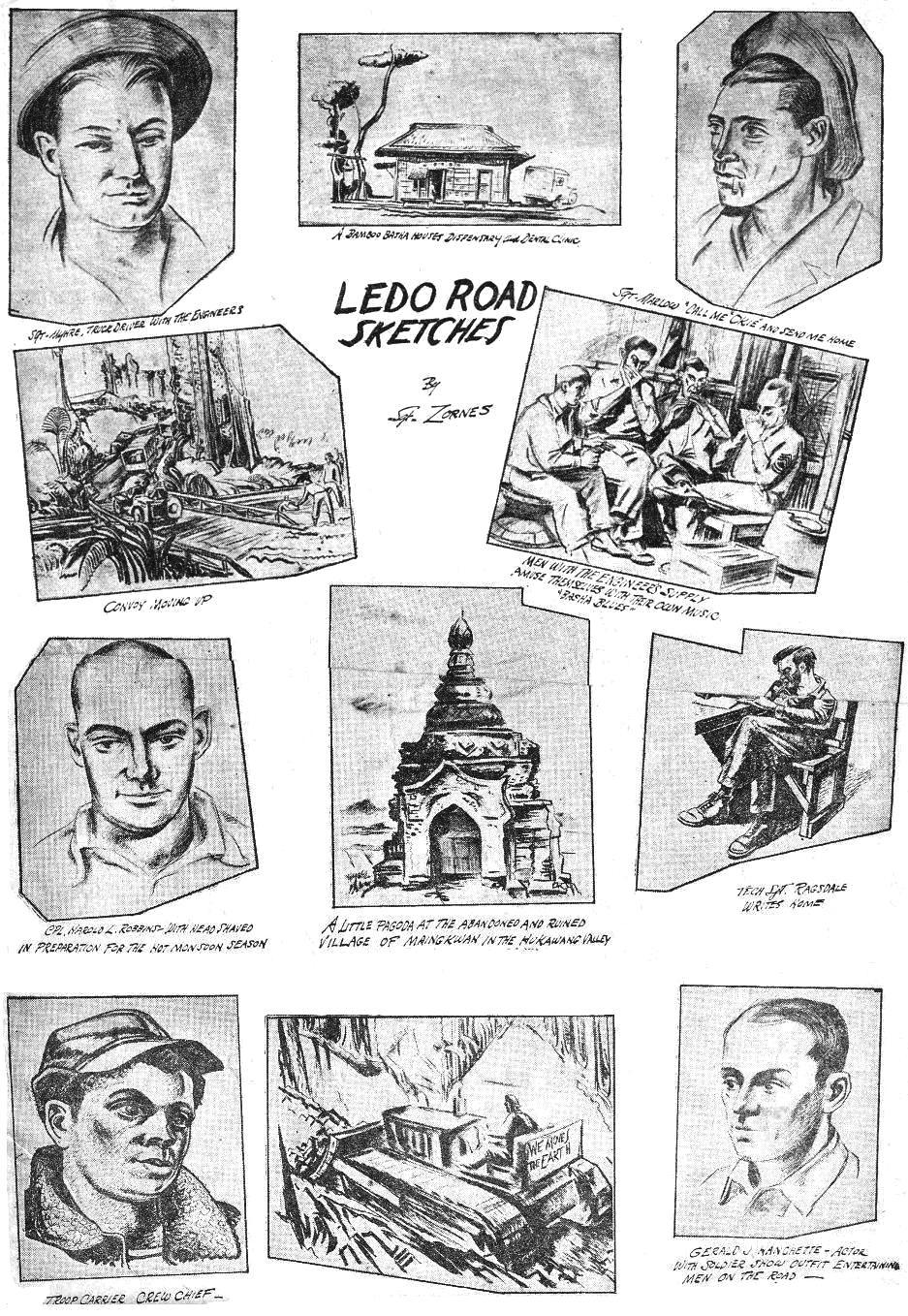
|
The CBI Roundup is a weekly newspaper of the United States Army Forces, published by and for the men in China, Burma, and India, from news and pictures supplied by staff members, soldier correspondents, the United Press, OWI and the Army News Service. The Roundup is published Thursday of each week and is printed by The Statesman in New Delhi, India. Editorial matter should be sent directly to Capt. Floyd Walter, Headquarters., U.S.A.F., C.B.I., New Delhi, and should arrive not later than Sunday in order to make that week's issue. Pictures must arrive by Saturday and must be negatives or enlargements. Stories should contain full name and organization of sender.

JUNE 1, 1944
Original issue of C.B.I. Roundup shared by Virginia Dyer, widow of CBI veteran Stanley Dyer.
Copyright © 2006 Carl Warren Weidenburner
VIEW ENLARGED SKETCHES
TOP OF PAGE PRINT THIS PAGE ABOUT THIS PAGE SEND COMMENTS
PREVIOUS ISSUE CLOSE THIS WINDOW NEXT ISSUE
